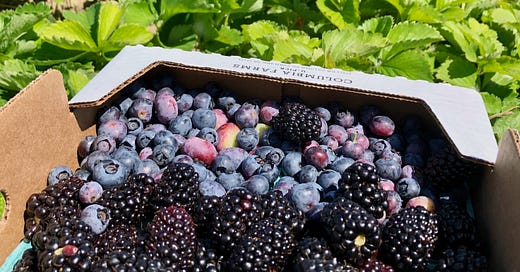Of all the seasonal shifts, fall has always been my favorite.
If FOMO was a whole season instead of a vibe, it would be summer. Everyone’s inviting you to barbecues and river floats, there are road trips to be driven and beaches to visit, and wave after wave of summer fruits to be eaten.
Don’t get me wrong.
Summer starts out fabulous.
But every year, the summery anticipation of spring shifts as the weeks tick by, until August hits and all you feel is exhaustion and panic that you won’t get through your ambitious summer wish list.
And right when you can’t take it any more, you wake up to a drizzle-gray morning, step on your first crispy leaf, and feel something imperceptibly unwind inside of your soul.
Fall’s all crunchy leaves and sweaters and hot toddies around the fire pit—which, for me, is a welcome relief after a season of margaritas and slip ‘n’ slides and sunbaked sidewalks.
Summer is active and adventurous.
Fall is quiet and meditative.
Summer launches itself like a cannonball into the middle of the pool, scattering our priorities and projects to god knows where.
Fall lets us finally catch our breaths and gather those priorities and projects back up.
For me, fall has always been a time to reset and regroup—but especially now as I’m at about the ten-week mark recovering from my eye injury.
Everything got scattered off my plate by summer and the shooting. The novel I was writing. The client book I’d just started interviews to ghostwrite. The new newsletter I’d just launched. The writing conference I’m organizing for next February.
And those are just the big ones! Dozens of smaller admin and personal projects also got scattered to the wind ten weeks ago.
This is the first time that my momentum has been torpedoed so thoroughly by injury—but it’s not the first time that my momentum has been torpedoed.
And I know I’m definitely not alone.
A big move, a lost job, a sudden illness, a wedding, a vacation, summer—any number of things can sneak up on a person and foil their best-laid plans.
But eventually, you do get to the other side. (Or at least somewhere close to the other side.) Eventually, you catch your breath and start scooping up your scattered priorities and figuring out how to get back on track.
The fact that my injury reset coincides with fall is a lovely resonance. Fall always brings about a small reflection and reset; this time, I’m looking at every aspect of my life.
The mantra that keeps floating through my head is this:
It’s not “catching up.” It’s a chance to reset from scratch.
Yes, there’s a lot I could catch up on. But what if I decided to start with a blank slate instead? What would that look like?
One of the problems with having great momentum is that you’re not always headed in the right direction. The go-go-go energy that helps you push forward and through your checklists is fundamentally at odds with the contemplative energy that helps you prioritize and direct your momentum.
In the best-case scenario, you’re harnessing them both by building regular check-ins and contemplation into your schedule—but if your plate has been so overloaded that you’re not taking regular breaks and resets, you might feel productive, but not be making headway on the things that really matter.
I’ve been in the process of triaging my scattered projects and digging back into the ones that still matter to me, and I’ll talk about the how-to practicalities in the next post.
But for today, consider this an invitation to take a few deep breaths of fall air and give your mind a chance to rest.
And ask yourself this:
Do you need to “catch up?” Or do you need to reset your priorities entirely?
From chaos with love,
Jessie
(P.S. For my readers in the Southern Hemisphere, I’m extremely curious what moods and reflections this time of year brings up for you! I’ve spent fall outside the Northern Hemisphere only twice in my life—once in Venezuela, once in Peru—but I haven’t ever lived a full year of seasons in a southern country. How does the autumn solstice affect your mind and productivity? What changes in nature do you see where you live, and how does that shape your natural creative rhythms?)




